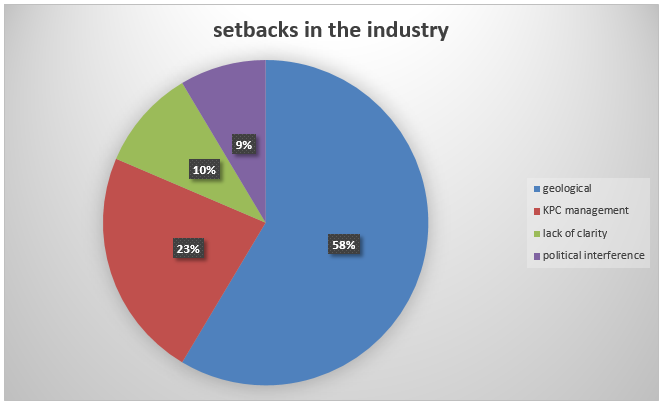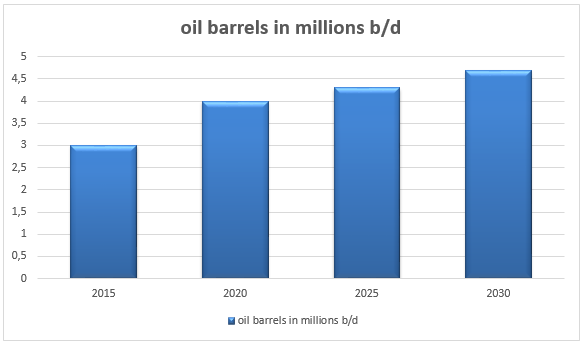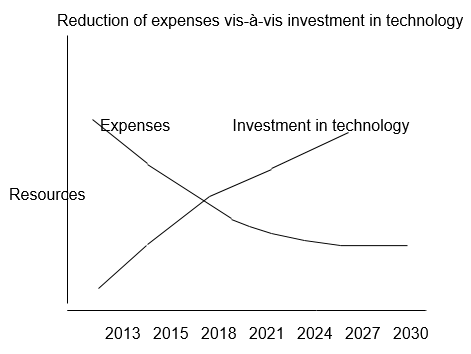For an industry to attain its objectives, it has to focus on strategic planning. For instance, Kuwait has an objective that is entwined in its vision 2033. It has to achieve this by ensuring that there is utter utility in production of energy (Federal Research Division 9).
However, several factors should be taken into consideration. To begin with, quite a number of setbacks normally affect the utility and production in the energy sector. For instance, the Kuwait energy industry is facing four major setbacks namely geological, KPC management, lack of clarity and political interference. Looking for appropriate ways of containing the stated setbacks is an opportunity to develop the industry.

To begin with, the country has to engage complex geology in finding untapped oil fields (Al-Dekhayel 29).
Though this requires massive investments, it is worthwhile. For instance, by the year 2020, Kuwait has an objective of attaining a capacity of 4 million b/d. Apparently, it only has a reserve of 101.5 billion barrels, which are not enough to achieve such a target. Therefore, the stakeholders will have to work an extra mile to achieve the target. Secondly, the country has to instill meritocracy in Kuwait Petroleum Corporation management. Mismanagement of the corporation is a setback to the performance of the industry. Thirdly, there is lack of clarity in the oil sector. Lack of stipulated laws makes it hard to achieve the stated targets. Lastly, the oil industry is marred with political interference.
This adversely affects the development of the industry as other parties misguide it. Therefore, to develop the industry, there should be unprejudiced management. The management should not be politically instigated, but instead function independently. Under such circumstances, the oil industry will most likely develop to conform to the vision 2033.

After dealing with the setbacks that affect the oil industry, the management will have to plot various development criteria to help improve the sector. First, the industry has to focus on the stated targets. For a country to develop, it has to make an upward improvement in the production. Therefore, the sector will only make an improvement when there is an increase in the production. Similarly, surpassing the targets will be appealing, as the industry will have surpluses, which can act as extra revenue. Secondly, the industry has to focus on the efficiency. Employing and deploying the appropriate number of workers in the industry will enhance productivity.
For instance, the sector should not be understaffed. Similarly, the industry should only employ people that are well trained and choreographed for the job. With such people, the organization will likely make an improvement. Thirdly, the industry has to focus on the developing technology in the world (Federal Research Division 9). Many countries that produce oil invest in new technologies to make work easier. Therefore, there is need to acquire updated machinery in order to achieve the targets.

Several stakeholders are involved in the oil industry. These include Kuwait Foreign Petroleum Exploration Company, Kuwait Energy Company, and Kuwait Oil Company. All these stakeholders and other involved parties have a role to play in improving the oil industry. First, they have to optimize their investments in the oil industry. With optimized investments, the oil industry will gain by realizing increased produce (Al-Dekhayel 32). Secondly, the chain of distribution will be improved. For instance, the government has a plan to expand the infrastructure. Coaxing such sectors will enhance the sector, as it will have efficiency and effectiveness in the production and distribution of oil in the country.
Works Cited
Al-Dekhayel, Abdulkarim. Kuwait: Oil, State, and Political Legitimation. Hoboken, NJ: Ithaca, 2000. Print.
Federal Research Division. Kuwait a Country Study. New York, NY: Kessinger Publishing, 2004. Print.